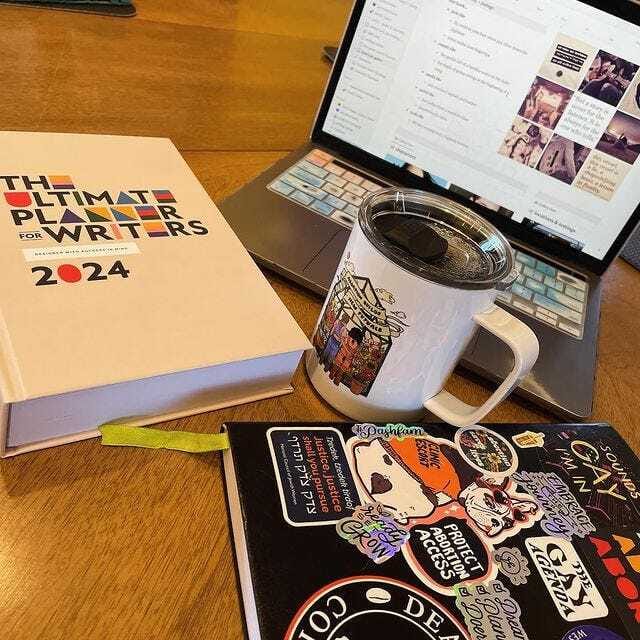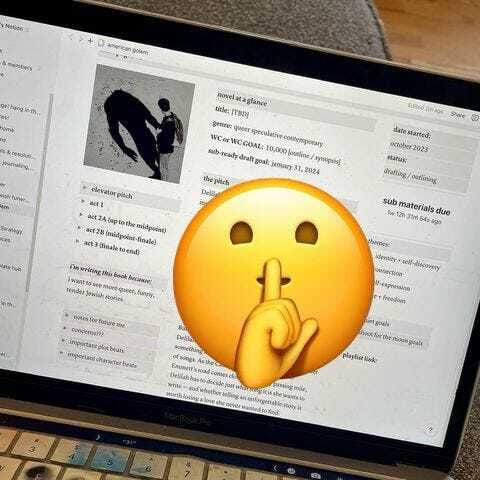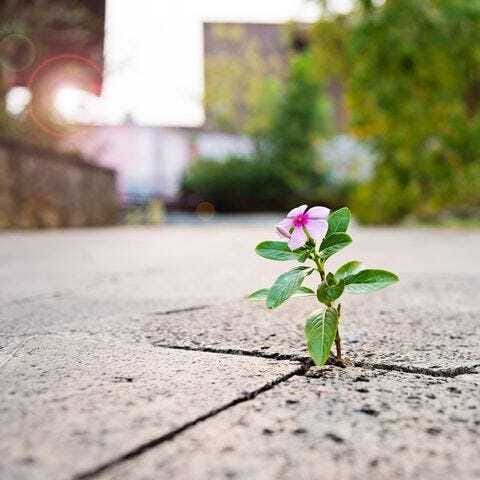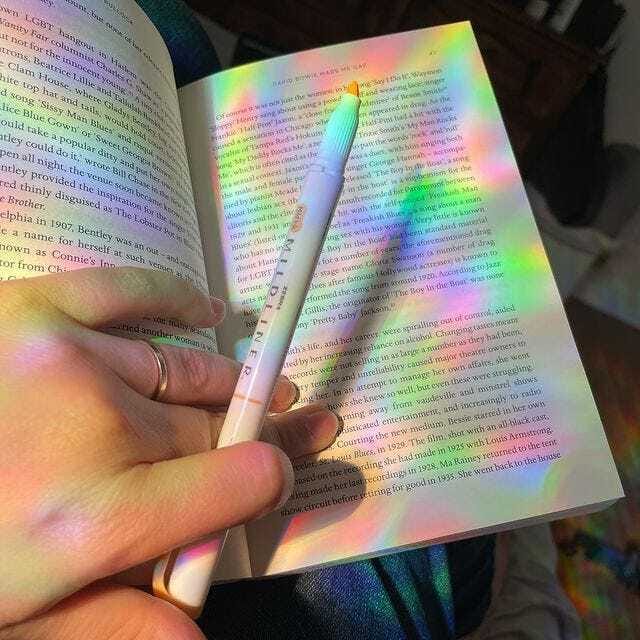- Creativity for Good
- Posts
- 😱🎃 spooky scary vulnerability
😱🎃 spooky scary vulnerability
the sophomore slump, existential anxiety, and the pit of despair
Here’s something almost nobody is surprised to learn about me: I’m a planner.
I love a good plan. Maybe it’s my Taurus rising, but knowing what I’m doing (and, ideally, when and how) makes me feel all warm and cozy and secure. I’m very much an outliner and a plotter, rather than a pantser — even when all I’m doing is indulging in some good fanfic-writing, I still work off an outline or a zero draft so that I at least know the shape of what I’m writing when I sit down to turn it into something I’m willing to let see the light of day.
When it comes to life beyond writing, I plan the hell out of…basically everything. I use Notion along with a pen-and-paper planner, and I spend a probably-ungodly amount of time every Monday figuring out my plan for the coming week, and even more time on the first day of every month looking at the month ahead, and don’t even get me started on January. I like mapping out my commitments, but more than that, I like setting goals. I do it for everything from the number of books I want to read to the number of walks I want to take to the number of yoga classes I want to go to…and yes, of course, how much I’m hoping to write.
Spoiler: I am falling extremely short on hitting the goals of what I’ve been hoping to write.
In all fairness, it’s been a challenging few months. My partner got a concussion in early September that’s led to a number of changes in our family, my own chronic health conditions have been flaring up, the news is a constant hellscape of horror that makes me want to take my babies and crawl into bed and never get out again, and things have been happening on the day job front that have basically been a giant recipe for slow descents into panic spirals. None of these things, I’m sure you’ll be shocked to know, are great for creativity. I was hoping to be about 40k into my draft of book two by the end of October. Instead, I’m at just over 13.5k — and that’s working off an extremely detailed synopsis that’s about as close to a full zero draft as I’ve ever written.
I’ll be honest. As a debut author working on a second book, especially one sufficiently plugged into the business of publishing to know how much a second book can depend on the success (or lack thereof) of the first, not feeling motivated to write is scary. There’s a lot of momentum involved in selling books, unless you’re someone with a big enough name that you can drop off the face of the earth for several years at a time, drop a banger of a bestseller, and then fade back into the void (Suzanne Collins, you have my dream life, and I envy you deeply). Knowing it’s likely to be more than a year between publishing my debut and announcing my second book — assuming I’m lucky enough to sell this book at all, and don’t end up going right back to the drawing board, which is for sure not a guarantee — makes me extremely nervous.
Writing can be hard at the best of times, even when you’re lucky enough to love the story you’re working on (and I do! I love it so much! I can’t wait for you to all read it, and my fingers are extremely crossed that someday you will!). In the harder times, creating can feel like an absolute slog, to the point where making something feels more like pulling teeth than planting seeds to be harvested into something beautiful.
Which leaves us, really, with only two options:
Stop making things until you feel better.
Make it anyway.
Going with stop making things, however tempting, is sort of like exclusively defining self-care as cancelling plans, taking a bath, having a treat, and going to bed early. It’s nice while it lasts, and it does make you feel better in the short term, but inevitably, the longer you wait to remember that self-care also includes taking a shower and putting the laundry away and eating a meal with multiple food groups and talking to another human being, the harder it is to get back to doing all of those things. This isn’t to say that if a story isn’t working you should keep hacking away at it even if you hate it, or that writing every day is the only way to write (on that note, fuck Stephen King, actually), but rather that nourishing our creative energy, in one form or another, does require constant tending, constant attention. Gardens have their winter seasons, when we step back from daily watering, but we still care for them in those colder months — clearing away leaves and debris, aerating the soil, adding mulch, trimming or pruning back overgrown branches — so that when planting season comes again, we aren’t returning to an overwhelming project instead of a welcoming plot of ready earth.
In our creativity, this can look like any number of things: Making playlists or mood boards, talking to friends about a project, active and immersive daydreaming, working through a problem or challenging aspect of a project while you do something with your hands or engage in some kind of movement activity — anything other than putting our creative energy into a box and pushing it into a dusty corner until we feel magically “ready” to open it up again. All that matters is we find some way to show up, to keep that creative spark alive.
And, yes: Of course this is true for our activism as well. I often think about the “parable of the choir” — the idea that a chorus of singers can maintain a note for far longer than any individual singer ever could, because while individuals may drop in and out in time with their needs for breath, the choir as a whole sings on, and the note is sustained. But the flip side of this metaphor is that even when we pause for breath, we don’t leave the choir altogether. We stay gathered, stay connected. We lend our strength to the larger whole in other ways, even as we take time to collect ourselves before we can return to the song. Just as we continue to nurture our creative energies, even when we’re not actively creating, we find ways to show up for the causes we care about, even when we’re not in the streets: We practice mutual aid, we provide childcare, we cook for our fellow activists, we read books or poetry or consume art created by the people most connected to the cause or impacted by the issue, we make sure our community knows that we’re still there, that we still care, that we’re still part of the movement, even if what that part looks like needs a few moments to be different. To breathe.
Carrie Fisher, space princess of blessed memory, said, “Stay afraid, but do it anyway. What’s important is the action.” To create while afraid, to take action for good while afraid, is to push back against the paralysis or avoidance that fear can make so extremely tempting. Doing nothing is always, by definition, easier than doing something — all the moreso when that something feels difficult or uncomfortable or challenging.
But we keep showing up, because the alternative is to let the garden go to ruin, to let the spark die, to let the choir fall apart.
So, here I am, in my state of creative anxiety. Trying to create, or to at least find ways to nourish creation. Making something, even if it’s not what I set out to make — a newsletter, for example, instead of a novel. Because it’s another way of showing up. Another way of planting the seeds. Another way, I hope, of singing.
questions on creating for good
Where are you in your creative cycle?
Is your creativity coming easily to you, or is creating a struggle? What do you notice yourself thinking or feeling when you work on your current project?
What nurturing do you need in this moment?
How can you tend to your creative self in a way that acknowledges where you are in your season or cycle? How can you involve your heart, your body, your mind? Do you feel a craving for something familiar, or a yearning for something new?
Where do you feel yourself taking comfort in inaction?
How do you recognize when you are avoiding discomfort rather than seeking safety? Where can you stretch yourself to take action while respecting your limits? What role can you play in your community and your movements in these moments?
updates from shelly
Rules for Ghosting has been out in the world for just over two months now. I hear from new readers every day who have found their way to Ezra and his story, and honestly, I can’t imagine anything more soothing to my anxious soul than reading the incredible messages folks have sent me. If you read and loved Rules for Ghosting, consider this a formal invitation to hit me up in the DMs — I would love to hear from you!
A few other tidbits of Rules for Ghosting news and press:
The New York Times included Rules for Ghosting in its list of spooky romance books to read this fall.
The incredible audiobook for Rules for Ghosting was featured in a New York Post roundup of novels to read this spooky season. (If you haven’t checked out the audiobook, narrated by the incredible Petey Gibson, you are missing out!)
I talked to The Forward about Rules for Ghosting, writing queer Jewish stories, literal and metaphorical ghosts, and what makes found families so special, even if your family of origin isn’t awful.
Rules for Ghosting was the Patreon Book of the Month for October with the Bad Bitch Book Club! I got to join their Zoom meeting for probably my favorite Q&A ever, and it was am absolute delight.
On an entirely different note: With my partner temporarily out of work for medical reasons, my freelancing tushie is currently our only income — so I am opening my books for writing and editorial services! If you or someone you know is looking for a freelance editor, copywriter, query critique, or social media strategist, come hit me up! The prices on my website are a starting point — sliding scales and individual pricing is always a possibility.
That’s all for me this month. Thank you for sitting with me in all this messy vulnerability, and continuing to show up — in whatever ways you show up — for the work, communities, and causes you care about. I’m so glad to be in this choir with you. 💜
resources, links, and further reading
spotlight on: doing it anyway
read: “six tips to help sustain your commitment to community” (lesley university)
read: “creative burnout & improving artist mental health” (sketch design repeat)
listen: “three hobbies every creative needs (the importance of side quests)” on the Creative Juice Box podcast
donate: palfest.org



